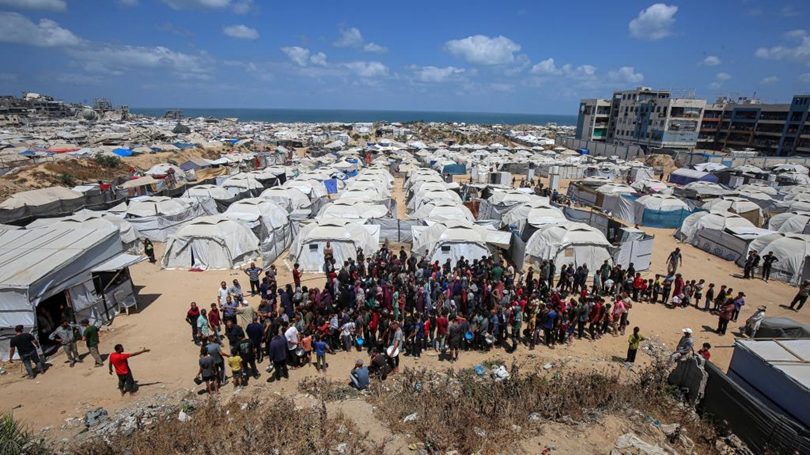
Palestinians wait to receive free food at a food distribution center in the al-Shati refugee camp, west of Gaza City, on May 28, 2025. [Photo/Xinhua]
Hamas said in an official statement on Wednesday that it has reached an agreement with U.S. Special Envoy to the Middle East Steve Witkoff on a general framework for Gaza ceasefire.
According to Hamas, the framework includes the release of 10 Israeli hostages and several bodies, in exchange for the release of an agreed-upon number of Palestinian prisoners, guaranteed by mediators.
Hamas said it is awaiting a final response to this framework, adding that "it is making significant efforts to halt the brutal war on the Gaza Strip."
The group said the framework "will ensure a permanent ceasefire, a complete withdrawal of Israeli forces from the Gaza Strip, the flow of aid, and a professional committee assuming control of the Strip's affairs immediately after the agreement is announced."
A Hamas official, who requested anonymity, said on Monday that Hamas had agreed to a proposal presented by Witkoff for a ceasefire in Gaza.
However, Witkoff denied that Hamas has accepted his proposal for a ceasefire and hostage release deal, according to the Axios news site.
Israel has not yet announced its official position on the proposal, while Israeli media outlets have quoted officials as saying that Israel rejects the proposal and will not accept it.
Israeli conditions for ending war
Abdel Mohdy Motawe, executive director of the Cairo-based Middle East Forum for Strategic Studies and National Security, said that Israeli Prime Minister Benjamin Netanyahu "rejects any idea of ending the war in the Gaza Strip except on certain conditions: Hamas withdrawing from Gaza's governance, disarming Gaza, and then exiling Hamas leaders" from the Strip.
"There is an Israeli consensus on these conditions with the U.S. administration, making it unlikely for Netanyahu to stop the war unless the conditions are met, though he might accept a partial deal," Motawe told Xinhua.
Mokhtar Ghobashy, secretary-general of the Al-Farabi Center for Studies in Egypt, stressed that the lack of substantial international pressure has enabled Israel to pursue its strategy in Gaza, adding the U.S. pressure on Israel is insufficient.
"Israel is exploiting the time frame and the regional context to pursue a dangerous, systematic approach for displacing Palestinians," he said.
Insuffient aid
The Israeli military said on Tuesday that two food distribution compounds operated by private U.S. companies had begun functioning in southern Gaza.
The initiative followed more than 11 weeks of an Israeli blockade preventing humanitarian supplies from reaching the enclave. Limited aid shipments were allowed last week, after UN experts warned that famine is spreading.
Thousands of Palestinians crowded into a humanitarian aid distribution center in Rafah on Tuesday, triggering chaos and a breakdown of order on the site's first day of operation under Israeli military oversight.
The center, established at the Al-Alam roundabout in southern Gaza by the Gaza Humanitarian Foundation (GHF), a U.S.-based organization, was intended to deliver food aid to a population facing severe shortages due to Israel's blockade. But scenes of disorder quickly unfolded as residents overran the facility, seizing food parcels and even dismantling parts of the barbed wire fencing that surrounded the site.
Jens Laerke, spokesperson for the UN Office for the Coordination of Humanitarian Affairs, said at a press briefing in Geneva on Tuesday that the UN is not involved in the GHF's operations in Gaza, and added that "it is a distraction from what is actually needed."
Laerke said what is truly needed is the reopening of all crossing points into Gaza.
Israel launched a ground and air offensive in Gaza following the Oct. 7, 2023 attack, in which Hamas-led fighters killed about 1,200 people and took 251 hostages, according to Israeli figures. The ensuing Israeli bombardments have devastated large parts of the enclave, killing at least 54,084 people and wounding 123,308 others, said the health authorities in Gaza on Wednesday.
Israel halted the entry of goods and supplies into Gaza on March 2, following the expiration of the first phase of a January ceasefire agreement with Hamas. It resumed attacks on Gaza on March 18.


 Share:
Share: 




 京公网安备 11010802027341号
京公网安备 11010802027341号